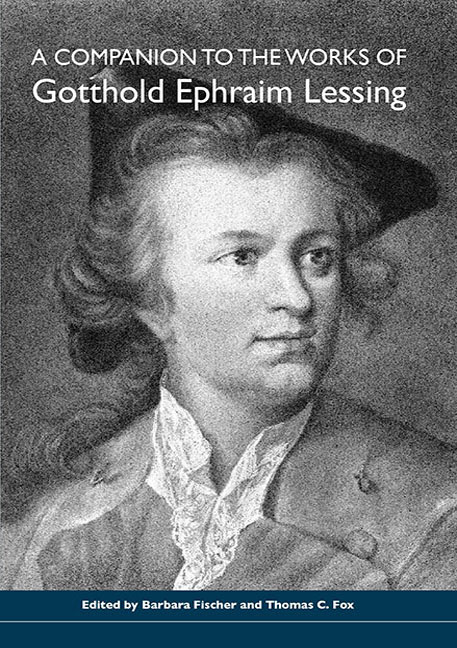Book contents
- Frontmatter
- Contents
- List of Illustrations
- Acknowledgments
- Lessing Editions and Abbreviations
- Selected Works by Lessing
- Introduction
- Lessing's Life, Work, and Times
- Criticism and Aesthetics
- Lessing the Critic: Polemics as Enlightenment
- Lessing and the Fable
- Lessing's Poetics as an Approach to Aesthetics
- Philosophy and Theology
- Drama and Drama Theory
- Reception
- Contact Organizations
- Works Cited
- Notes on the Contributors
- Index
Lessing the Critic: Polemics as Enlightenment
from Criticism and Aesthetics
Published online by Cambridge University Press: 28 April 2017
- Frontmatter
- Contents
- List of Illustrations
- Acknowledgments
- Lessing Editions and Abbreviations
- Selected Works by Lessing
- Introduction
- Lessing's Life, Work, and Times
- Criticism and Aesthetics
- Lessing the Critic: Polemics as Enlightenment
- Lessing and the Fable
- Lessing's Poetics as an Approach to Aesthetics
- Philosophy and Theology
- Drama and Drama Theory
- Reception
- Contact Organizations
- Works Cited
- Notes on the Contributors
- Index
Summary
The Age of Criticism
The significance of Lessing for literary criticism can be justly compared to that of Kant for the Enlightenment's critical method. Criticism became for both of them an activity to which all else must be subordinated, as Kant wrote in the preface of his Kritik der reinen Vernunft (Critique of Pure Reason, 1781). Both used their critical arsenals to destroy old dogmas and new prejudices; they thought independently and wrote on behalf of a reading public. Between the compulsive systematization of rules and dogmatic Aristotelianism of Gottsched's school on the one hand and a nascent theory of aesthetics by the disciples of Alexander Gottlieb Baumgarten (1714–1762) on the other, Lessing developed a new literary criticism — one that did equal justice to both the principles of art and the emotional responses to it. This sort of transformation was wrought in the literary debates after 1750, and it has had consequences for literary criticism ever since. The critic reasons openly before the public and on its behalf, and he stimulates public discussions, the goal of which is to arrive at a consensus. To be sure, discussions on aesthetics and criticism in the eighteenth century were not just intellectual debates about art and taste, they also had indirect consequences for the development of a bourgeois public sphere in Germany, which explains their often polemical tone.
Attentive contemporaries recognized early on that Gotthold Ephraim Lessing's arrival marked the start of a new epoch of literary criticism. “Es ist hier ein neuer Criticus aufgestanden,” reported Johann Georg Sulzer in 1751 to Johann Jakob Bodmer in Zurich, “er scheint nur noch ein wenig zu jung.” At that time Lessing was still an unknown editor of the Berlinische privilegirte Staats- und gelehrte Zeitung (later Vossische Zeitung), in which he published a monthly supplement, “Das Neueste aus dem Reiche des Witzes” (The Latest from the Realm of Wit). In it he reviewed the latest publications and established himself as an independent critic between Leipzig and Zurich. His famous seventeenth letter of the Briefe, die neueste Literatur betreffend (Letters Concerning the Newest Literature, 1759) is well known, but this was not the first attack on Gottsched's authority.
- Type
- Chapter
- Information
- A Companion to the Works of Gotthold Ephraim Lessing , pp. 67 - 88Publisher: Boydell & BrewerPrint publication year: 2005



